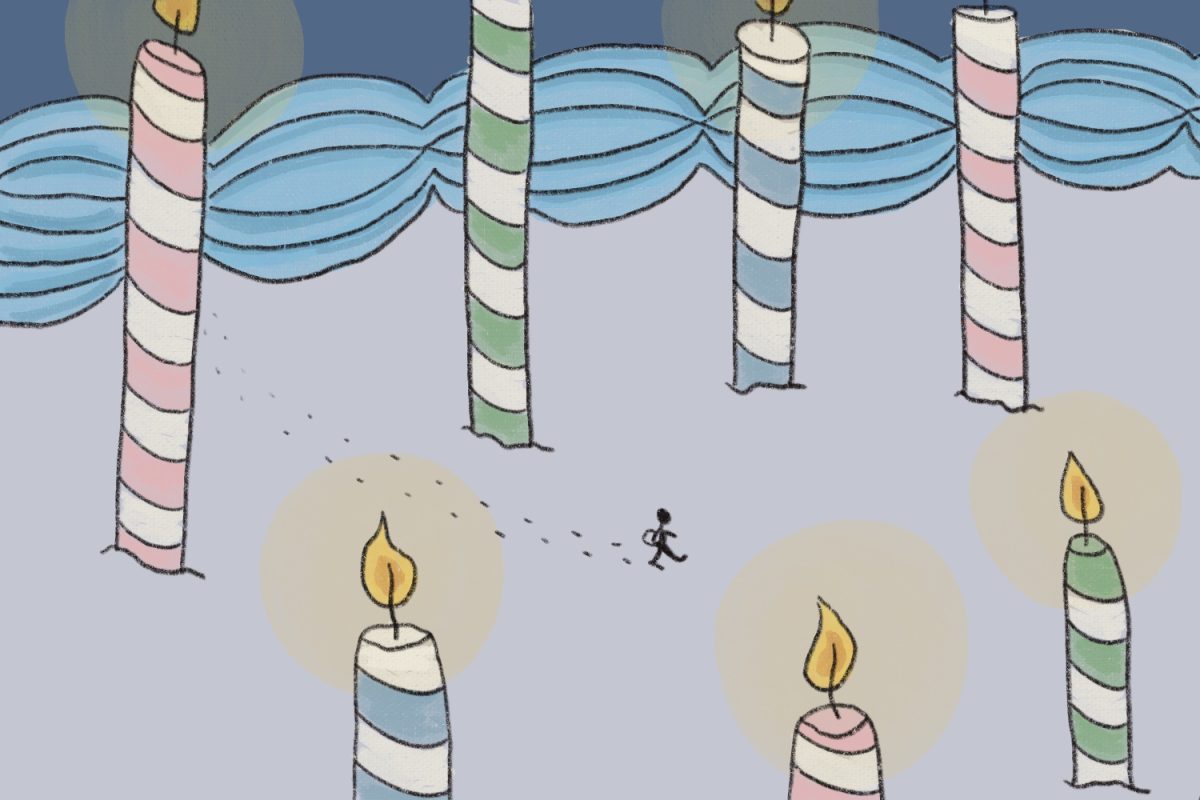I’ve been counting down—in dread—my last few months, weeks and, now, days of teenagerdom. If you’re reading this, it’s too late.
Over winter break, I stayed up late and slept in past noon everyday. I was lazy and angsty and mad at the world. I thought to myself, it’s my last month as a teen: might as well be immature for a little while longer.
Twenty is a scary number. Even though the concept of being a teenager is completely arbitrary, I truly relished the label. Every year since I turned fifteen has been my favorite age—though I reckon my real favorite age was seventeen—it’s just so teenager-y.
But time doesn’t care, I’m going to turn twenty—god willing—whether I like it or not. So I decided instead of being all sad about something I can’t control, I’d like to reflect on my past twenty years in lessons learned.
- Surround yourself with people better than you. Over the years, I’ve noticed that my closest friends were not just people I liked hanging out with, but people that I looked up to and admired for a variety of reasons. I find being around high-achieving people inspiring and motivating.
- Better to do something shittily than not at all. This one tends to be tough for the “former gifted kid” crowd but, even if you fail, a fifty will always be better than a zero.
- Sometimes it’s ok to be boring. Not everyone needs to know how funny you are all the time. They also don’t need to know what you’re thinking right now.
- But also, sometimes it’s ok to be obnoxious. At least you’re saying something. People who are too scared to contribute love making fun of people for whom the gift of words comes naturally. I’m kidding, but there’s a bajillion reasons why someone might find you, yes, you the reader, annoying. You can’t really control that.
- Participation is more about helping the person who is asking you to participate than it is about looking cool in front of your classmates. You don’t get cool points for raising your hand, but at least you save your professor from another two minutes of painfully awkward silence. This doesn’t just go for participating in class, though, sometimes it’s about attending a middle-school reunion, or going to your RA’s floor events, or going to alumni events you dread. Actually, it’s mostly about going to alumni events.
- Not every funny story is worth telling. Not immediately, at least. As a chronic attention whore, every time something remotely interesting, embarrassing or just plain sad happens to me, I get the urge to share it with others in the hopes my misery will make them laugh. The risk is when your funny story leaves your circle and becomes characteristic of how people think of you and people still reference it years later.
- Commit to the bit, but don’t be surprised when you become the bit. Think the age-old tale of the boy who cried wolf meets jester’s privilege. If you make everything into a joke, when the time for earnesty comes, people might not take you seriously. I have been a victim of this in the past: in high-school, I dated the head of the improv club—I know, rookie mistake. When we broke up, I had multiple friends who didn’t believe me and thought it was just another bit. In the end, the joke was on me.
- If you feel bad after hanging out with them, they’re not your friends. I’ve had to learn this one over and over.
- The only way to make real connections is to allow yourself to be vulnerable. This one is often the most difficult. When I first started college, I was frustrated that my new friends didn’t quite get me like my friends from home. At first I just chalked it up to time and assumed it would resolve itself, but at a certain point I realized that I was the reason I didn’t feel as close with my friends here. I was keeping an emotional distance between myself and them, never showing too much of myself, for fear of rejection.
- Technically having the “right of way” doesn’t matter when you’re about to get T-boned by a suburban. Literally and metaphorically. Sometimes you will logically be correct and yet you will have to bend to appease less rational individuals in order to protect your well-being. Sometimes it’s enough just to know you’re in the right.
- All’s fair in love and war. If you’ve known me for a while, chances are you’ve heard me say this. It’s half a joke, because actually no, not everything is fair in love and war, otherwise we wouldn’t have stuff like girl-code or the Geneva conventions. But on the half-serious side, people do weird shit in the heat of the moment, and should be granted a little bit of lee-way for that.
- Get to know your instructors and have at least one “friend” in every lecture. Whether TA, professor or otherwise, make sure your instructors know who you are and know that you care about the class
- Self-deprecating “humor” isn’t charming. You’re not being humble, you’re not being funny and it’s awkward for everyone. Say something negative about yourself enough times and other people will start to believe it. On the flip side, “fake it ‘til you make it” works.
- Sometimes you do not want to know. Before I fuck around, I try and consider how much I really want to find out. Ignorance is bliss.
- For every “flaw” in your personality, there’s always a way to get something positive out of it. An outlet, one might say. For instance, my need for attention and to express my thoughts might be annoying to my private story viewers, but it’s also what makes me a good fit for opinion columns. My critical nature might not be appropriate in every setting, but when I’m editing pieces, it’s crucial.
- Apathy is lame. Immerse yourself in art and culture. I don’t care if I sound pretentious, but I’d rather care and learn about things than just follow my TikTok for you page.
- Ask for forgiveness, not for permission. My parents will be familiar with this one.
- Communication is key, but more communication is not always better. Communication is not an inherently “good” or “bad” thing. Sometimes it’s better to take space than to just keep talking about things.
- This too shall pass. I often find comfort in reminding myself that everything is temporary, even good things. Like the tide, life is a constant ebb and flow. Sometimes everything is good, sometimes everything is bad. Like the tide, we have no control over it. We just have to do our best to live through it.
- The art of losing isn’t hard to master. This one I stole from my good friend, the poet Elizabeth Bishop, whose poem “One Art” I like so much I have it up on my wall by my bed. As someone who is constantly losing every single one of my belongings—I’ve lost my wallet for months at a time, not once but twice—and a victim of the human condition, I appreciate the reminder that loss is no disaster.
Maybe my third decade won’t be so bad. And maybe yours won’t either.
Stay on the lookout for my upcoming self-help novel.










